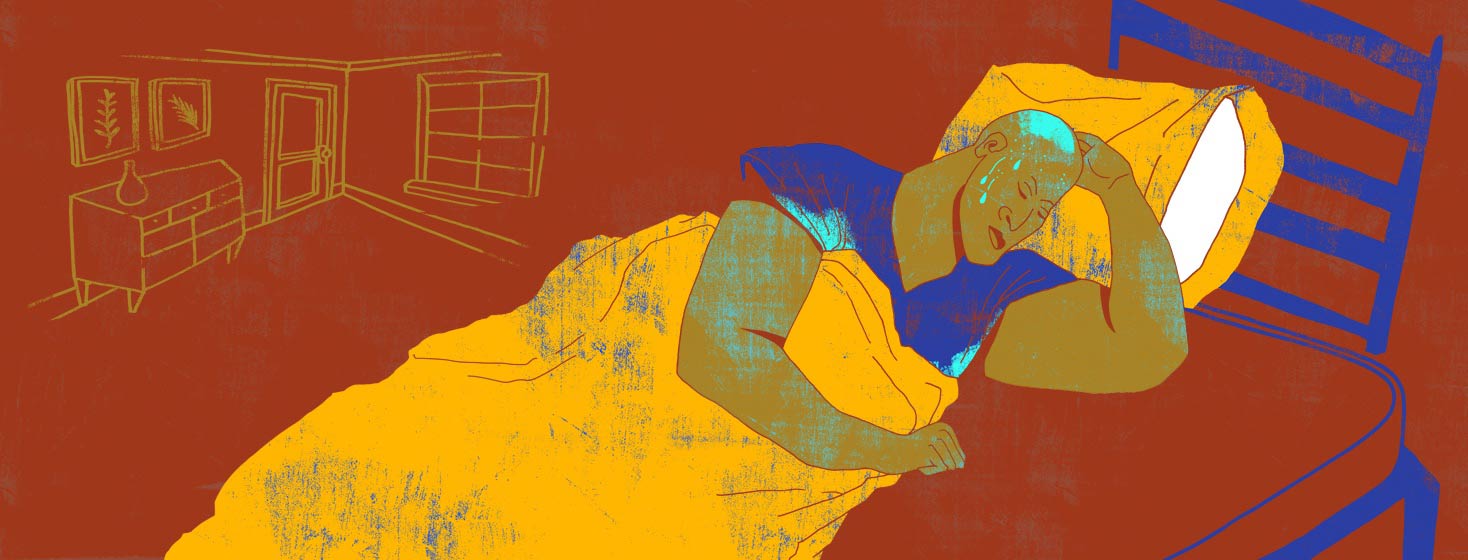HIV and Night Sweats: What They Are and What to Do About Them
Getting good sleep is critical for people living with HIV.
A full night of sleep allows for periods of deep nonREM sleep (clinically known as stage 3 sleep) to happen. During this time, the body releases human growth hormone in order to help the body heal, repair, and fight infection.1
However, poor sleep (and little stage 3 sleep) can suppress the immune system. Clearly, people living with HIV need stage 3 sleep! Still, to achieve it, they must cycle through other sleep stages, undisturbed.2
The message is simple: People living with HIV need as much undisturbed, consolidated sleep as possible to enjoy these crucial benefits.
And yet, we face so many obstacles to a good night's sleep. One obstacle that isn't always discussed, but can be uncomfortable, distracting, and detrimental to sleep health, is night sweats.
Featured Forum
View all responsesWhat causes night sweats
We all sweat as a response to:
- Heat exposure
- The body working harder than normal (due to fever, medication side effects, or physical activity)
- Stress - both emotional and physical
- Hormone shifts
And yes, we even sweat during sleep. Why? It’s a matter of biology.
Circadian rhythms influence our sleeping periods, with the body’s circadian clock regulating our temperature based on different factors. Two factors that affect this include the time of day (the body cools at night but warms during the day) and the type of sleep stage (nonREM sleep requires both brain and body to cool).3,4
At nighttime, the body experiences a slight decrease in core body temperature. This is due to less muscular activity, which generates body heat, and automates circadian and biological processes, which promote rest.
The body, if it’s still warm as you head off to bed, will try to cool itself through sweating. This is one reason why a warm or cool bath or shower at bedtime is preferred to a hot one. You don’t want to raise your core body temperature at bedtime as it could delay your ability to fall asleep.5
But night sweats don’t just describe feeling hot at bedtime. They’re a different and more difficult—problem altogether.
Featured Forum
View all responsesRelated conditions
This kind of sweating during sleep is extreme and uncomfortable, leading to soaked pajamas, sheets, mattresses, hair, and skin. Even worse, it steals the sleep your body needs to stay healthy.
Night sweats, while commonly linked to menopause, also happen as a response to serious diseases or conditions such as:
- Certain cancers
- Some neurological conditions
- Major infections, including HIV.
Night sweats and HIV
For people living with HIV, night sweats remain a common symptom.
In fact, for some people, it's that long spell of night sweats that prompts them to see a doctor. During this time, it's when they first discover they've acquired HIV. HIV-related night sweats can be accompanied by symptoms that suggest flu-like illnesses:
- Chills
- Diarrhea
- Fever
- Joint pain
- Rapid weight loss
- Swollen glands
Treatment through the stages of HIV
The severity of HIV-related night sweats depends a great deal on diagnosis, disease phase, and treatment.
Night sweats caused by HIV often occur during an early phase of HIV known as the acute phase. This phase occurs within 2 to 4 weeks after being exposed to and acquiring HIV.
During this phase, night sweats mark the presence of active infection. While they don’t indicate disease severity, these night sweats can be hard to manage.
The good news is, treating HIV brings eventual relief for night sweats. Those occurring during the acute phase of HIV generally stop once a prescribed antiretroviral treatment begins.
In less than 6 months, the treatment kicks in, the person living with HIV will be in the chronic phase. Once in the chronic phase, people often get rid of their night sweats entirely.
People with undiagnosed or untreated HIV, however, should expect more severe cases of chronic night sweats as time and phasing passes. These night sweats include the added, sleep-stealing discomfort of:
- Depression
- Excessive Daytime Sleepiness or Fatigue
- Genital sores
- Memory loss
- Mouth sores
- Pneumonia
- Skin rashes
When to talk to your doctor
It's never a bad idea to talk to your doctor about your night sweats, especially if you find yourself experiencing other symptoms, like:
- Abdominal pain
- Chronic cough
- Chronic pain
- Coughing up blood
- Poor sleep
Tips for improving sleep
As for self-care, you may also consider the following strategies for getting through a period of night sweats:
- Flip your pillow (it’s cooler on the other side)
- Place an ice pack between the pillowcase and the pillow
- Change into fresh pajamas (or sleep nude)
- Change your sheets
- Layer bedclothes for easy peel-off, pull-on comfort
- Turn down the thermostat
- Use a fan
- Open a window
- Take a cold shower or bath
- Drink cold water at bedtime
- Keep ice water on your nightstand for sips throughout the night

Join the conversation